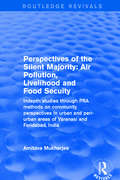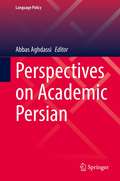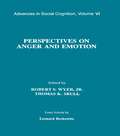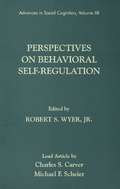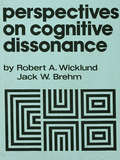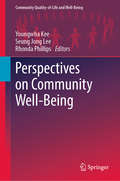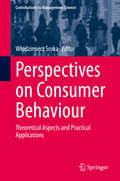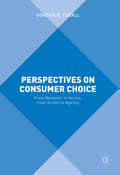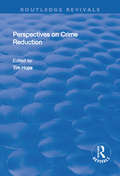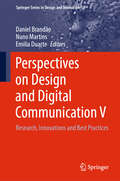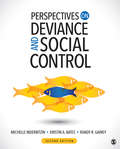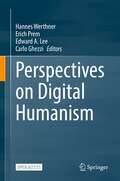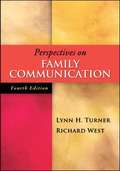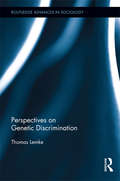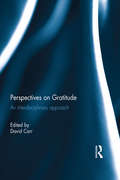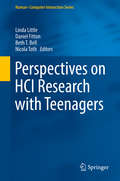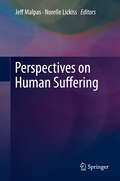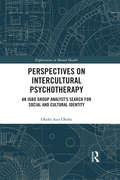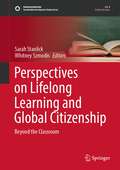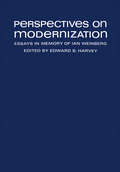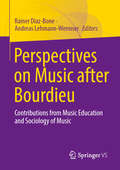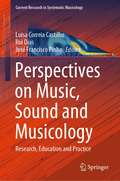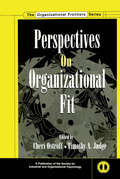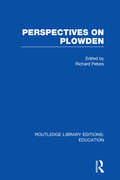- Table View
- List View
Perspectives of the Silent Majority: Air Pollution, Livelihood and Food Secuity - Indepth Studies Through PRA Methods on Community Perspectives in Urban and Peri-urban Areas of Varanasi and Faridabad, India (Soas- Studies In Development Geography Ser.)
by Amitava MukherjeeThis title was first published in 2001. This text is an exercise in learning from the voices of the communities living in Indian villages near urban areas. It is concerned, primarily, with learning what these communities have to say on their well-being and livelihoods and is, therefore, an attempt to record and register as much as possible of what these communities say. Agriculture in urban areas of Haryana and Uttar Pradesh plays an important role for livelihoods and in supplying foodstuffs to communities and markets. It constitutes a major source of income both for landowners and labourers. The study then looks at the relationship between agriculture and urban areas, and the phenomenon of industrialization/urbanization. In presenting these perspectives, the farmers gave insights into some related issues such as the role of agriculture in their livelihoods, the nature of agricultural constraints and the the impact of air pollution on quality of life.
Perspectives on Academic Persian (Language Policy #25)
by Abbas AghdassiThis book focuses on the idea of Academic Persian in the growing competition of many Middle Eastern languages to produce and highlight their academic discourse. Similar to academic English, most West Asian languages including Persian, Turkish, and Arabic are developing new styles and genres to produce academic texts. The book addresses a major question: "What is academic Persian?" Intended for researchers, experts, analysts, policy-makers, and students in Persian, Iranian studies, and Islamic studies, as well as Near Eastern languages and Middle Eastern cultures and languages, the book includes numerous technical contributions on the emerging markets involving west Asian languages. Since indexing, abstracting, crawling, metrics, citations, and visibility are becoming hot issues for academics, service providers (e.g., publishers) and policy-makers (e.g., university heads), a knowledge of academic Persian will help readers to grasp what Persian, and other similar languages, require in academic markets.
Perspectives on Anger and Emotion: Advances in Social Cognition, Volume Vi (Advances in Social Cognition Series #Vol. 6)
by Robert S. Wyer Thomas K. SrullIn this volume, Berkowitz develops the argument that experiential and behavioral components of an emotional state are affected by many processes: some are highly cognitive in nature; others are automatic and involuntary. Cognitive and associative mechanisms theoretically come into play at different times in the emotion-cognition sequence. The model he proposes, therefore, integrates theoretical positions that previously have been artificially segregated in much of the emotion-cognition literature. The breadth of the implications of Berkowitz's theory is also reflected in the diversity of this book's companion chapters. Written by researchers whose work focuses on both social cognition and emotion, these articles provide important insights and possible extensions of the "cognitive-neoassociationistic" conceptualization developed in the target article. Although each chapter is a valuable contribution in its own right, this volume, taken as a whole, is a timely and important contribution both to social cognition and to research and theory on emotion per se.
Perspectives on Behavioral Self-Regulation: Advances in Social Cognition, Volume XII (Advances in Social Cognition Series #Vol. 12)
by Robert S. WyerThe feedback model of self-regulation developed by the authors of the lead article in this volume has been one of the most successful theoretical formulations of regulatory processes to date. The range of phenomena to which this framework potentially applies is evident from its ability to incorporate implications of other conceptualizations as diverse as catastrophe theory and dynamic systems theory. The diversity of issues and approaches dealt with by Carver and Scheier is matched by the companion articles, which are written from perspectives ranging across developmental psychology, cognitive science, clinical psychology, and organizational decision making, as well as mainstream social cognition.
Perspectives on Cognitive Dissonance
by R. A. Wicklund J. W. BrehmPublished in 1976, Perspectives on Cognitive Dissonance is a valuable contribution to the field of Social Psychology.
Perspectives on Community Well-Being (Community Quality-of-Life and Well-Being)
by Rhonda Phillips Youngwha Kee Seung Jong LeeThis volume brings together multiple diverse perspectives from around the globe on quality of life and community well-being from a place-based perspective. It provides both conceptual and applied explorations across disciplines, ideas and perspectives to foster more interest and research in community well-being. Topics include surveying at the community level, child friendly communities, collective impact, grieving, and happiness. Those working in the areas of public policy, community development, community and social psychology, as well as planning and development will find this volume particularly useful for the array of perspectives, research, and analytical approaches presented.
Perspectives on Consumer Behaviour: Theoretical Aspects and Practical Applications (Contributions to Management Science)
by Włodzimierz SrokaThis book explores key factors associated with consumer behaviour, from both a theoretical and practical perspective. It particularly focuses on the consumer in the 21st century – educated and conscious, but also impatient, disloyal and capricious. The book is divided into three main parts: the first part discusses the theoretical and legal aspects of consumers’ behaviour, analysing the government's role in regulating consumer behaviour and the role of the European Union. The second part then examines organisational strategies, such as omni-channel retailing and branding products. And lastly, the third part describes consumer behaviours in the context of individual products and services, from coffee to energy.
Perspectives on Consumer Choice
by Gordon R. FoxallEvaluating the ways in which we construe consumer choice, this book examines the psychology, methods and realities of the role it plays for today's consumer. Confronted by competing brands and products, services, and e-tailed opportunities that are but a click away, how does the consumer choose among them to achieve the particular array of goods to suit their lifestyle? Consumer researchers often seek to explain consumer choice by attributing it to beliefs, desires, attitudes, and intentions in the absence of any theoretical justification. Perspectives on Consumer Choice is the outcome of a research program that employs cognitive explanations in a responsible and disciplined way to genuinely elucidate consumer choice in social scientific terms. Employing a reasoned approach to understanding consumption, this book builds upon theoretical and empirical research in economic psychology, behavioral economics and philosophy as well as marketing and consumer research.
Perspectives on Crime Reduction (Routledge Revivals)
by Tim HopeThis title was first published in 2000: The papers in this volume are concerned with the prevention of crime. Like other books in the International Library, the text is intended primarily for reference by those who need to reflect upon what criminology has had to say about important, contemporary concerns of criminal policy. The papers present a kind of history of ideas which together trace the emergence of some key components of contemporary thinking about reducing crime.
Perspectives on Design and Digital Communication V: Research, Innovations and Best Practices (Springer Series in Design and Innovation #50)
by Nuno Martins Daniel Brandão Emilia DuarteThis book gathers new empirical findings fostering advances in the areas of digital and communication design, web, multimedia and motion design, graphic design, branding, and related ones. It includes original contributions by authoritative authors based on the best papers presented at the 7th International Conference on Digital Design and Communication, Digicom 2023, together with some invited chapters written by leading international researchers. They report on innovative design strategies supporting communication in a global, digital world, and addressing, at the same time, key individual and societal needs. This book is intended to offer a timely snapshot of technologies, trends and challenges in the area of design, communication and branding, and a bridge connecting researchers and professionals of different disciplines, such as graphic design, digital communication, corporate, UI Design and UX design.
Perspectives on Deviance and Social Control
by Randy R. Gainey Michelle L. Inderbitzin Kristin A. BatesPerspectives on Deviance and Social Control provides a sociological examination of deviance and social control in society. Derived from the same author team’s successful text/reader version, this concise and student-friendly resource uses sociological theories to illuminate a variety of issues related to deviant behavior and societal reactions to deviance. The authors briefly explain the development of major sociological theoretical perspectives and use current research and examples to demonstrate how those theories are used to think about and study the causes of deviant behavior and the reactions to it. Focusing on the application—rather than just the understanding—of theory, the Second Edition offers a practical and fascinating exploration of deviance in our society.
Perspectives on Deviance and Social Control
by Randy R. Gainey Michelle L. Inderbitzin Kristin A. BatesPerspectives on Deviance and Social Control provides a sociological examination of deviance and social control in society. Derived from the same author team’s successful text/reader version, this concise and student-friendly resource uses sociological theories to illuminate a variety of issues related to deviant behavior and societal reactions to deviance. The authors briefly explain the development of major sociological theoretical perspectives and use current research and examples to demonstrate how those theories are used to think about and study the causes of deviant behavior and the reactions to it. Focusing on the application—rather than just the understanding—of theory, the Second Edition offers a practical and fascinating exploration of deviance in our society.
Perspectives on Digital Humanism
by Hannes Werthner Carlo Ghezzi Edward A. Lee Erich PremThis open access book aims to set an agenda for research and action in the field of Digital Humanism through short essays written by selected thinkers from a variety of disciplines, including computer science, philosophy, education, law, economics, history, anthropology, political science, and sociology. This initiative emerged from the Vienna Manifesto on Digital Humanism and the associated lecture series. Digital Humanism deals with the complex relationships between people and machines in digital times. It acknowledges the potential of information technology. At the same time, it points to societal threats such as privacy violations and ethical concerns around artificial intelligence, automation and loss of jobs, ongoing monopolization on the Web, and sovereignty. Digital Humanism aims to address these topics with a sense of urgency but with a constructive mindset. The book argues for a Digital Humanism that analyses and, most importantly, influences the complex interplay of technology and humankind toward a better society and life while fully respecting universal human rights. It is a call to shaping technologies in accordance with human values and needs.
Perspectives on Family Communication
by Richard West Lynn H. TurnerEmphasizing the role that communication plays in both creating and solving family issues, Perspectives on Family Communication thoroughly reflects the explosion of research literature in the area of family communication. Now in its fourth successful edition, the text continues to emphasize the role that communication plays in the evolution of family issues. Throughout, the text examines a wide variety of contemporary family types and supports this examination with current research and practical examples.
Perspectives on Genetic Discrimination (Routledge Advances in Sociology #100)
by Thomas LemkeOver the past 15 years, a series of empirical studies in different countries have shown that our increasing genetic knowledge leads to new forms of exclusion, disadvantaging and stigmatization. The spectrum of this "genetic discrimination" ranges from disadvantages at work, via problems with insurance policies, to difficulties with adoption agencies. The empirical studies on the problem of genetic discrimination have not gone unnoticed. Since the beginning of the 1990s, a series of legislative initiatives and statements, both on the national level and on the part of international and supranational organizations and commissions, have been put forward as ways of protecting people from genetic discrimination. This is the first book to critically evaluate the empirical evidence and the theoretical usefulness of the concept of "genetic discrimination." It discusses the advantages and limitations of adopting the concept, and offers a more complex account distinguishing between several dimensions and forms of genetic discrimination.
Perspectives on Gratitude: An interdisciplinary approach
by David CarrPsychologists, philosophers, theologians and educationalists have all lately explored various conceptual, moral, psychological and pedagogical dimensions of gratitude in a rapidly expanding academic and popular literature. However, while the distinguished contributors to this work hail from these distinct disciplines, they have been brought together in this volume precisely in recognition of the need for a more interdisciplinary perspective on the topic. While further developing such more familiar debates in the field as whether it is appropriate to feel grateful in circumstances in which there is no obvious benefactor, whether it is proper to feel grateful to those who have benefited one only from a sense of duty and whether it makes sense to be grateful if so doing colludes with injustice, the essays in this collection explore a wide variety of fresh conceptual, psychological and moral issues. For example, in addition to identifying some new moral paradoxes about gratitude and seeking a generally more morally discriminating approach to gratitude education, relations are explored between gratitude and humility, forgiveness and appreciation and the religious and spiritual dimensions of the concept are also given much overdue attention. By drawing together serious academic engagement with the study of gratitude and a serious attempt to undertake this within an interdisciplinary perspective, Perspectives on Gratitude will be of value to academics and graduate students in the fields of philosophy, psychology and theology, as well as other research-based disciplines.
Perspectives on HCI Research with Teenagers
by Linda Little Daniel Fitton Beth T. Bell Nicola TothTeen Computer Interaction is concerned with the design, evaluation and implementation of technologies for teenagers and with the study of major phenomena surrounding them. It aims to give special consideration to the unique development issues and diversity of this particular user group. Teenagers are possibly the most diverse, dynamic and technologically-aware user group. Working with teenagers can enable researchers to gather valuable insights and opportunities to inform the design and implementation of new technologies. Researchers have now begun to acknowledge that Teen Computer Interaction is a specialised area of HCI and this book brings together some of the best work in this field to-date. The book provides relevant HCI communities with an inclusive account of methods and examples of best practice to inform those working with teenagers in research and design projects. The chapters recount research with teenagers in many different domains and provide many different contributions to the field of Teen Computer Interaction including design methods, models, case studies and ethical considerations. The aim of this book is to provide a solid foundation from which the discipline of Teen Computer Interaction can grow, by providing a valuable resource for those wishing to conduct HCI research with teenagers. Perspectives on HCI Research with Teenagers is aimed at academics, practitioners, designers, researchers and students who are interested in the new and emergent field of Teen Computer Interaction.
Perspectives on Human Suffering
by Jeff Malpas Norelle LickissThis volume brings together a range of interdisciplinary perspectives on a topic of central importance, but which has otherwise tended to be approached from within just one or another disciplinary framework. Most of the essays contained here incorporate some degree of interdisciplinarity in their own approach, but the volume nevertheless divides into three main sections: Philosophical considerations; Humanities approaches; Legal, medical, and therapeutic contexts. The volume includes essays by philosophers, medical practitioners and researchers, historians, lawyers, literary, Classical, and Judaic scholars. The essays are united by a common concern with the question of the human character of suffering, and the demands that suffering, and the recognition of suffering, make upon us.
Perspectives on Intercultural Psychotherapy: An Igbo Group Analyst’s Search for Social and Cultural Identity (Explorations in Mental Health)
by Okeke Azu-OkekeIn Perspectives on Intercultural Psychotherapy, Okeke Azu-Okeke explores cultural identity by drawing on his own experience as the first and only Black trainee in an Institute for Group Analysis in London and the impact this has had on his work as a lecturer and supervisor, as well as research from his group analysis sessions over many years to contribute a deeper awareness of the serious aspects of colonialism. Drawing from the perspective of an Igbo man of the older generation who grew up in two conflicting cultures, the traditional Igbo culture of Nigeria and that of the British colonialists, Okeke provides a thorough study of how cultural identity can influence research and practice in whatever form it takes: the academic, the theoretical, the economic and the psychological. The book discusses how ignoring deeply held social and spiritual values can alienate many trainees and potential clients from participating in the professions of psychotherapy and counselling. It also reflects on the author’s research into traditional Igbo methods of healing and compares these with Western models, especially of group analysis, and discusses how mutual learning can be achieved. This book will be of great interest to counsellors and psychotherapists; arts therapists; sociologists and anthropologists; policy makers engaged in health and social care policies; practitioners of alternative medicine; social workers and mental health workers at all levels.
Perspectives on Lifelong Learning and Global Citizenship: Beyond the Classroom (Sustainable Development Goals Series)
by Sarah Stanlick Whitney SzmodisThis book lays the groundwork for the future of global citizenship, and it discusses where we are now, where to go from here, and how all of this fits into a lifelong learning context. It incorporates case studies, meta-narratives, and empirical studies to support cosmopolitanism through a lifelong learning lens and is a must read for educators, activists, non-governmental organizations, civil society, and community organizations. The framing for this book is with the United Nations Sustainable Development Goal 4 in mind: ensuring inclusive and equitable quality education and promoting lifelong learning opportunities for all, with the intent that all learners will acquire the knowledge, skills, and attitudes necessary to promote “sustainable lifestyles, human rights, gender equality, promotion of a culture of peace and non-violence, global citizenship and appreciation of cultural diversity and of culture’s contribution to sustainable development” (UN Sustainable Development Goal, target 4.7). It is through this lens that this book showcases the work of researchers, practitioners, civil society, and thought leaders in global citizenship for lifelong learning. While this tension between nationalism and cosmopolitanism exists, the wheels of globalization still turn and shape our local, national, and global connections. Through this exploration, this book lifts up examples of global citizenship education done well, across the age spectrum, and in a variety of contexts. The binding factor is the core values, ethics, and moral structure of a world in collaboration toward its larger human and ecological thriving. It unpacks complex topics such as ethical and cultural relativism, accountability and responsibility in a global world, decolonial education and unmaking ideas of “development”, and ethical models for community-based global learning and engagement. What voices are missing in the discussion of global learning and global citizenship education?
Perspectives on Modernization: Essays in Memory of Ian Weinberg
by Edward HarveyPerspectives on Modernization is published in memory of Ian Weinberg, a sociologist of brilliant promise who died at the age of thirty. It consists of essays by his colleagues, students, and teachers which reflect upon and carry further Ian Weinberg's major scholarly concerns – the processes of industrialization and modernization of societies. The book begins with an essay by Ian Weinberg which was presented at the annual meeting of the American Sociological Association, 1968. It is followed by a paper of wide scope and interest, Wilbert E. Moore's 'Normative Conflict in Stages of Cultural Change.' Noting that the study of rapid social change can no longer be confined to the so-called modernizing countries, Moore argues that comparable normative conflicts occur at comparable stages of cultural change. Rainer C. Baum and Charles Tilly are concerned with the serious gaps in the theory of modernization and politics. Baum is specifically concerned with developing a political analogue to the theory of economic development; Tilly concentrates on a longitudinal study of the relationship between modernization and collective political conflicts. S.D. Clark writes of patterns of urban growth, looking at two exceptions to the well-studied outward movement of immigrants in Canadian cities. Edward Shorter studies the modernization of sexual attitudes by analysing illegitimacy. The last three papers approach modernization through economic changes and development: H. Nishio analyses the relationships between political control and economic development in Japan over two centuries; Stanely R. Barrett studies the transition of the economy in a Nigerian utopian community from communalism to partial private enterprise; and L.R. Marsden, E.B. Harvey, and J. Bulcock explore the relationship of literacy and economic development in thirty-nine African countries. The volume includes an introduction by the editor and an outline of Ian Weinberg's short but brilliant career. These essays are, like the work of the man they seek to honour, wide ranging and intellectually provocative in their approach to a complex question. The volume is a fitting tribute to both the man and the spirit of intellectual vitality to which he was committed.
Perspectives on Music after Bourdieu: Contributions from Music Education and Sociology of Music
by Rainer Diaz-Bone Andreas Lehmann-WermserThe sociology of Pierre Bourdieu has become one of the most influential theories in music education and sociology of music. Generations of scholars in both fields have applied, criticized and advanced the concepts and methods invented by Bourdieu and his school. The volume presents new contributions on the relevance, actuality and perspectives of Bourdieu&’s theory in the field of music production and music reception. The volume advances the interdisciplinary evaluation of Bourdieu&’s approach and contributes to a new evaluation of the Bourdieusian approach in the field of music research.
Perspectives on Music, Sound and Musicology: Research, Education and Practice (Current Research in Systematic Musicology #10)
by Luísa Correia Castilho Rui Dias José Francisco PinhoThis book gathers a set of works highlighting significant advances in the areas of music and sound. They report on innovative music technologies, acoustics, findings in musicology, new perspectives and techniques for composition, sound design and sound synthesis, and methods for music education and therapy. Further, they cover interesting topics at the intersection between music and computing, design and social sciences. Chapters are based on extended and revised versions of the best papers presented during the 6th and 7th editions of EIMAD–Meeting of Research in Music, Arts and Design, held in 2020 and 2021, respectively, at the School of Applied Arts in Castelo Branco, Portugal. All in all, this book provides music researchers, educators and professionals with authoritative information about new trends and techniques, and a source of inspiration for future research, practical developments, and for establishing collaboration between experts from different fields.
Perspectives on Organizational Fit (Siop Organizational Frontiers Ser.)
by Timothy A. Judge Cheri OstroffThis book concerns how employees consider their work lives, how well they fit their jobs, the work setting, other people, and what is important and valued in their organizations. Perspectives on Organizational Fit, a new book in SIOP's Organizational Frontiers Series, takes a scholarly look at fit in organizations: the relationship between individu
Perspectives on Plowden (Routledge Library Editions: Education)
by Richard PetersThe Plowden Report, Children and their Primary Schools (1967), had a huge impact on education in the latter 20th century, but at the time was labelled as left-wing, and of no practical use to the problems of education in the 1960s. The contributors to this volume were all concerned with the educational thinking of the Plowden Report, and its appropriateness or otherwise to the educational needs of the day. In quarters where the Plowden Report was treated as an authoritative textbook, the views in this volume provide a valuable critique.
